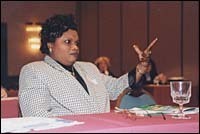Contracts for women business owners are out there if they know where to look —
and state and federal governments and private corporations are a great place to
start.
At the “Women Mean Business” program held recently during R.I. Minority Enterprise Development Week, representatives from the state Department of Administration and WBENC, the Women’s Business Enterprise National Council, met to alert business owners on ways to access new markets in government and private industry.
The state of Rhode Island is a huge buyer, said Dorinda Keene, contract compliance officer with the Minority Business Enterprise Compliance Office, and women business owners shouldn’t assume that they don’t have what it takes to secure a state contract.
“Whether you sell toilet paper or you are a huge computer consultant, the state purchases everything,” she said. “They have contracts for people to come in and water the plants.”
(A recent glance at the contract bids included items such as cash registers, polar fleece blankets and hats, a digital camera and men’s boxer shorts, and crews to clean up the beach.)
But to get such contracts businesses first must be registered as vendors, through applications that can be downloaded from www.purchasing.state.ri.us.
The site also posts all state bid opportunities and requests for proposals in excess of $2,500 for regular contracts and $5,000 for construction contracts, and provides links to quasi-state agencies, local governments and links to 50 states.
Bid opportunities change daily, Keene said, suggesting that members visit the site at least once a week. There are also links to master price agreements, and information on who holds contracts now, when they expire and what the competitive bids were, which is “very valuable information.”
In Rhode Island, small women-owned businesses can register under the Disadvantaged Business Enterprise category, because here, “women are presumed to be socially disadvantaged,” Keene said.
Advantages of this certification are many, including the state law that women and minority-owned firms get 10 percent of state contracts. The state buys $430 million worth of goods and services, she said.
Also, private industry uses their lists. They don’t have to, but they “recognize it’s good business.” Another advantage, if your firm is certified as women- or minority-owned, is that if your bid comes within 5 percent of the lowest bid, the purchasing agent has the option of giving you all or part of the contract. “It’s not mandated, but it is utilized,” Keene said.
Women can also apply for federal Small Business Administration certification at the SBA Web site at www.SBA.gov and get linked up with their procurement tool “Pro-Net,” an Internet-based database on more than 195,000 small, socially disadvantaged, 8(a) and women-owned businesses.
This information is free to federal and state government agencies as well as prime and other contractors seeking small business contractors, subcontractors and/or partnership opportunities.
Keene said those who don’t want to fill out two separate forms can send a copy of their SBA application when they apply for state certification. “I could care less what the letterhead says. The information is exactly the same.”
She said she is also available to help women connect with purchasing agents in state government, and that the R.I. Economic Development Corporation also provides procurement technical assistance to help Rhode Island businesses bid for federal contracts.
For more information call Keene at the Department of Administration, Minority Enterprise Compliance Office at 222-6670 or the EDC at 222-2601.
Women do mean business
According to Traci Mahan, program director for the New England office of WBENC, registering with their nonprofit agency as a Women’s Business Enterprise or WBE provides direct access to corporate markets.
WBENC, created in 1997 and headquartered in Washington, D.C., exists to provide women owned businesses access to a national standard of certification and corporate purchasing managers through an Internet database – with the goal of expanding opportunities and eliminating barriers in the marketplace.
Although it works, certification in this case is just a marketing tool, so women still must be aggressive, Mahan said, adding that men, who compose 39.2 percent of the population, continue to hold 95 percent of top management positions such as president, vice president or CEO.
Men, she said, also compose 77 percent of governors, 70 percent of tenured faculty, 90 percent of news editors and 75 percent of TV directors.
Women-owned businesses, on the other hand, which generated more than $3.6 trillion in sales in 1998, a 132 percent increase since 1992, still get only 2.4 percent of federal contracts, a figure Mahan said is “only good in milk, not in purchasing statistics.”
Women owned businesses do only slightly better in corporations, with 3 percent of corporate contracts in the 25 major U.S. industries. But, but with WBENC it’s getting better, she said.
Because even though private industry is not required to award a certain percentage of contracts to women and minorities, again they know it’s good business. Mahan said a common refrain among corporate purchasers is that “it’s so much easier to work with women,” because they’re prone to meet deadline, to follow through, and “they run efficient businesses.”
It costs $250 to be WBE certified and a $200 yearly re-certification after that. The application process is pretty thorough, but Mahan said it’s not about trying to make applicants “jump through hoops,” but to ensure that member companies are truly those that are owned and operated by women – not companies where a female’s signature exists as a beard.
About 30 businesses in New England right now are members of WBENC.
For more information, visit www.wbenc.org
or call Mahan at 1-617-536-0700, ext. 240.













